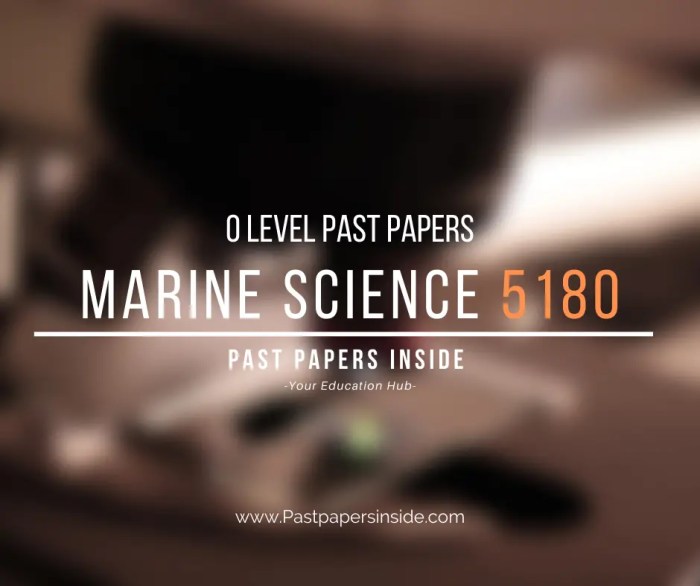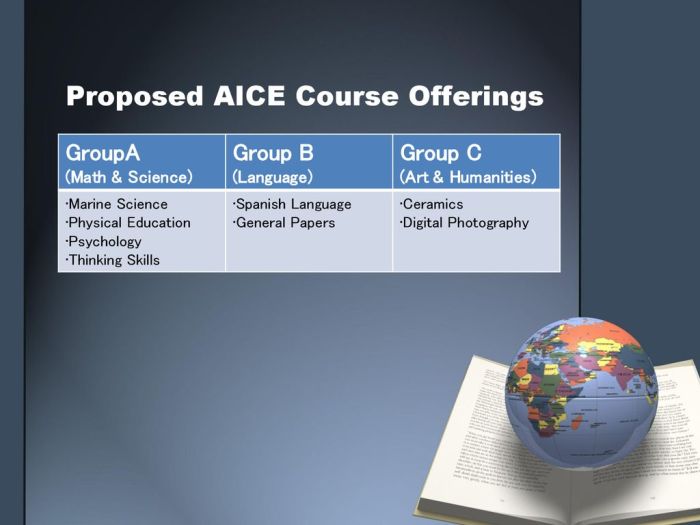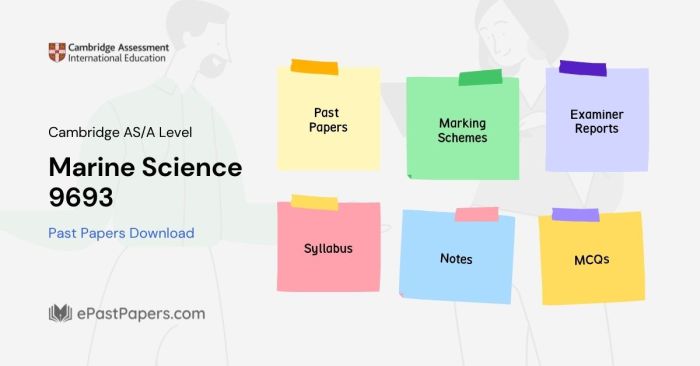Dive into the depths of AICE Marine Science past papers and discover the secrets to exam success. These invaluable resources provide a roadmap to understanding the exam structure, identifying key concepts, and developing effective study strategies.
By analyzing past papers, you’ll gain insights into the types of questions you can expect, the level of difficulty, and the specific topics that are frequently tested. This knowledge empowers you to focus your studies and maximize your preparation time.
Past Papers Overview
AICE Marine Science past papers are invaluable resources for students preparing for their exams. They provide insights into the types of questions that may be asked, the level of difficulty, and the format of the exam.
Analyzing past papers allows students to identify areas where they need to focus their studies and to practice answering questions in a timed environment. This helps them to improve their time management skills and to build confidence in their ability to perform well on the exam.
Importance of Analyzing Past Papers
- Provides insights into exam format and question types
- Helps identify areas for focused study
- Improves time management skills
- Builds confidence and reduces exam anxiety
Paper Structure and Content

AICE Marine Science past papers adhere to a consistent structure and format to evaluate students’ understanding of the subject matter. These papers are designed to assess students’ knowledge and skills across various aspects of marine science.
Tackling AICE Marine Science past papers can be a daunting task, but it’s essential for exam preparation. To enhance your understanding of the subject matter, consider reading “The Sexton Stood in the Porch” here . This literary piece offers insights into the complexities of life, akin to the challenges you may face in your studies.
By exploring both literary and scientific perspectives, you can broaden your comprehension and ace those AICE Marine Science past papers.
The papers typically consist of three sections:
Section A: Multiple Choice
- Comprises 40 multiple-choice questions covering a range of topics in marine science.
- Each question provides four possible answers, with only one being correct.
- This section tests students’ basic understanding of key concepts and their ability to apply their knowledge.
Section B: Short Answer, Aice marine science past papers
- Consists of six short-answer questions that require students to provide concise and accurate responses.
- Questions in this section assess students’ ability to recall and explain specific concepts and processes.
- Students are expected to demonstrate their understanding of the underlying principles and their ability to articulate their thoughts clearly.
Section C: Essay
- Includes two essay questions that require students to demonstrate their in-depth understanding of marine science topics.
- Essays typically require students to analyze, evaluate, and synthesize information from various sources.
- This section assesses students’ ability to critically think, formulate arguments, and communicate their ideas effectively in written form.
Question Analysis

Examining past papers reveals a range of question difficulties, catering to students of varying abilities. The questions cover a comprehensive array of marine science concepts, ensuring a thorough assessment of candidates’ knowledge and understanding.
Common Themes and Concepts
- Marine Ecosystems: Questions explore the structure, dynamics, and interactions within marine ecosystems, including food webs, biodiversity, and ecosystem services.
- Oceanography: Questions cover physical, chemical, and geological aspects of the ocean, such as ocean currents, water chemistry, and plate tectonics.
- Marine Biology: Questions assess knowledge of marine organisms, their adaptations, behavior, and ecological roles.
- Human Impacts on the Marine Environment: Questions address the effects of human activities on marine ecosystems, including pollution, overfishing, and climate change.
- Research Methods: Questions evaluate candidates’ understanding of scientific methods used in marine science, including data collection, analysis, and interpretation.
Skills and Knowledge Required
Answering the questions effectively requires a combination of skills and knowledge, including:
- Conceptual Understanding: A solid grasp of marine science concepts and theories.
- Analytical Skills: The ability to analyze and interpret data, draw conclusions, and solve problems.
- Problem-Solving Abilities: The capacity to apply knowledge and skills to address complex marine science issues.
- Communication Skills: The ability to communicate scientific findings and ideas clearly and effectively.
Exam Preparation Strategies

Past papers are invaluable resources for exam preparation. By reviewing and analyzing past papers, you can gain insights into the exam format, question types, and marking schemes. This knowledge can help you identify areas where you need to focus your studies and improve your exam-taking skills.
Reviewing and Analyzing Past Papers
To effectively review and analyze past papers, follow these steps:
- Start early:Begin reviewing past papers well before the exam to give yourself ample time to identify areas for improvement.
- Read the questions carefully:Pay attention to the wording and requirements of each question. This will help you understand the concepts being tested and the level of detail required in your answers.
- Identify key concepts:Highlight or make notes of the main concepts covered in each question. This will help you focus your studies and identify areas where you need to strengthen your understanding.
- Analyze the marking scheme:Pay attention to the marks allocated for each question. This will help you understand the relative importance of different topics and how to allocate your time during the exam.
Practicing and Honing Exam-Taking Skills
Once you have reviewed and analyzed past papers, it is important to practice your exam-taking skills. This will help you become familiar with the exam format and time constraints and improve your ability to answer questions effectively.
- Simulate exam conditions:Create a mock exam environment by setting a timer and working through past papers without distractions.
- Time management:Practice allocating your time wisely. Focus on answering the questions that carry the most marks first and leave yourself enough time to review your answers.
- Answering techniques:Develop effective answering techniques, such as using clear and concise language, providing specific examples, and referencing relevant theories or concepts.
Resources and Support

Preparing for AICE Marine Science exams can be daunting, but you’re not alone. Numerous resources and support systems are available to assist you in your journey.
Online Platforms
Harness the power of the internet to access a wealth of resources. Educational websites, such as Khan Academy and Crash Course, provide comprehensive video lessons, practice questions, and study materials tailored specifically to Marine Science. Utilize online forums and discussion boards to connect with fellow students and experts, exchanging insights and seeking clarification on challenging concepts.
Study Groups
Joining or forming a study group can significantly enhance your preparation. Collaborate with peers, share notes, engage in discussions, and quiz each other to reinforce your understanding. Study groups provide a supportive environment where you can learn from others, challenge your perspectives, and boost your confidence.
Textbooks and Study Guides
Invest in a comprehensive textbook that aligns with the AICE Marine Science curriculum. Supplement your textbook with study guides that provide concise summaries, practice questions, and additional resources. These materials serve as invaluable references throughout your preparation journey.
Tutoring and Support
Consider seeking additional support from a qualified tutor or academic advisor. They can provide personalized guidance, clarify complex concepts, and help you develop effective study strategies. Many schools and universities offer tutoring services to students preparing for exams.
Quick FAQs: Aice Marine Science Past Papers
What is the importance of analyzing past papers?
Past papers provide invaluable insights into the exam structure, question types, and frequently tested topics. They help you identify areas for improvement and develop targeted study strategies.
How can I effectively use past papers for exam preparation?
Review past papers thoroughly, identify common themes and concepts, and practice answering different types of questions. Use them to assess your understanding and pinpoint areas where you need additional support.
What resources are available to support my preparation?
Online platforms, study groups, and tutors can provide additional support and guidance. Seek out resources that align with your learning style and provide opportunities for collaboration and discussion.